Going Pro: Is It Too Easy To Earn A Pro License in Long-Distance Triathlon?
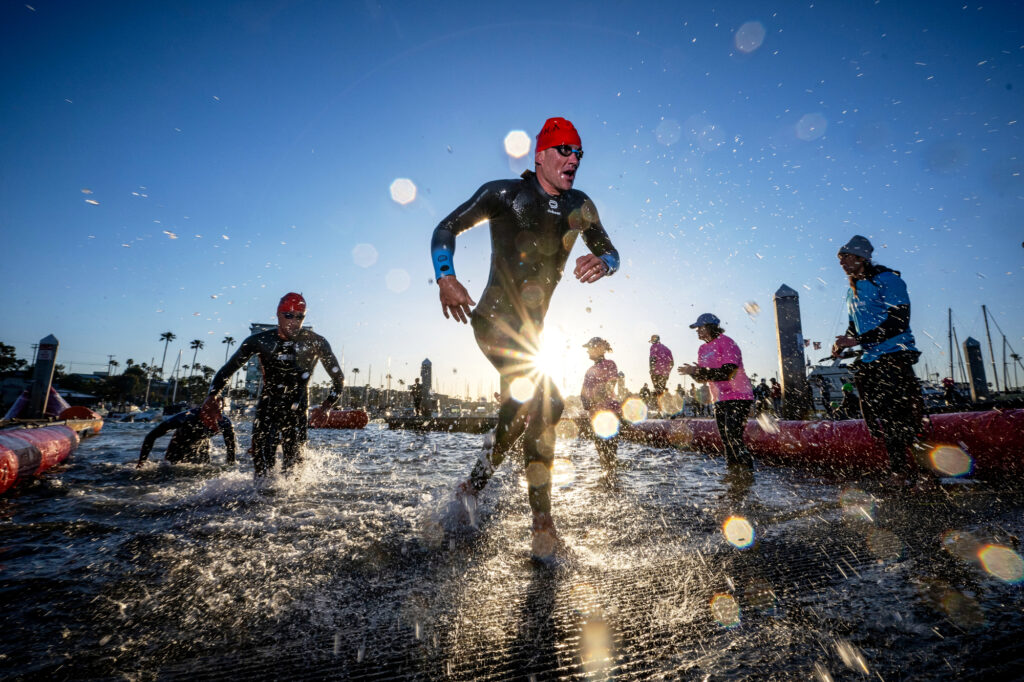
Photo: Donald Miralle/IRONMAN.
There isn’t another sport quite like triathlon when it comes to the pro ranks. Triathlon has no teams and, therefore, no drafts into professional leagues and, unlike many other sports, amateurs can go toe-to-toe with pros at competitions around the globe. Organizations like the NBA and MLB have altered how people look at professional sports, which is why the realm of pro triathlon is such a funny and interesting little world. Today, we are kicking off a mini-series that will take a deeper dive into professional triathlon, and we will get started with the root of it all: how one becomes a pro in the sport, how this process differs around the world, and whether it is too easy to earn pro status as a triathlete — specifically when it comes to long-distance racing.
Pro Cards Around the World
In the U.S., an athlete can become a professional triathlete through a number of routes, all of which are determined by USA Triathlon (USAT). One of these paths toward going pro is to finish within eight percent of the winning elite time in three separate USAT-sanctioned events that offer a prize purse of $5,000 or more.
Another option for Americans is to finish in the top 10 overall and within eight percent of the winner’s time at the World Triathlon age group world championships. If an athlete is hoping to compete at longer races, they need to finish in the top 10 overall among age groupers at the IRONMAN World Championship (no time criteria, just straight top 10). Athletes can also earn a pro card in the U.S. through a top-five finish at the USAT age group nationals or USAT Collegiate Club National Championships.
In the U.K., British Triathlon has slightly tougher standards that must be met in order to obtain a pro racing license. For short-course, draft-legal racing, British athletes can earn their pro card if they finish within three percent of the winner’s time at a World Triathlon Senior Continental Cup event. For longer racing, a Brit must compete at the world or European middle- or long-distance championships, and finish within eight percent of the winning time. Brits can also secure their pro license by finishing in the top 40 overall (not among age groupers, but of all athletes) at the IRONMAN World Championship or 70.3 worlds.
In Australia, the criteria gets a little more challenging. There are many routes to a pro card Down Under, but none are easy. AusTriathlon, the governing body of the sport in Australia, lists multiple age group events at which athletes can earn a professional license (such as the IRONMAN Asia Pacific Championship and the Australian Long Distance Triathlon Championships), but they will have to podium to meet the pro standard.
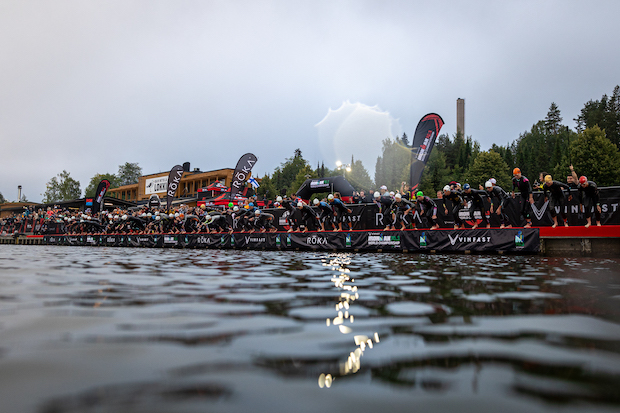
Photo: Ville Kaskivirta for IRONMAN
A top-five result at the World Triathlon age group championships, IRONMAN World Championship, or 70.3 worlds will also book a triathlete their pro license, but they must be within five percent of the fastest age grouper at the race. An overall age group win (beating all racers, not just winning a specific age category) at an IRONMAN, 70.3, or Challenge race can also deliver an athlete their pro card, but the event must feature a pro field and the athlete’s time has to be within five percent of the professional winner’s result.
Too Easy?
Becoming a professional triathlete is by no means easy. The people who earn their pro cards are not stumbling into professional triathlon. They’re remarkable athletes who have trained hard to get where they are. However, just because it’s not necessarily easy to become a pro doesn’t mean that the process shouldn’t be tightened up a bit with more difficult qualification standards.
Take a look at the results of any high-profile IRONMAN or 70.3 event at which top pros raced. Scroll to the bottom of the professional standings and check out the times and overall placing of the bottom pros. Often there will be multiple pros who were beaten by many (sometimes upwards of 50) age group athletes. Of course, there is the case to be made that these pros could simply have had bad days — perhaps they were racing through illness or injury, or maybe they got a flat on the bike — but a quick search of many of these names will show that they are repeat offenders — athletes who compete as pros in multiple events a year and lose to dozens of age groupers at each race.
One reason athletes can get themselves into this position is because IRONMAN and 70.3 racing has no tiers when it comes to professionals. In other sports, there are levels to being a pro. In basketball, the NBA is at the top, there is the NBA’s farm team system, and there are countless leagues in Europe, Asia and beyond, all of which vary in overall player skill level. If a player is drafted to the NBA, he has to prove himself and earn his spot on the roster every game, otherwise he will be cut and eventually forced to settle for one of these lower leagues. This is even the case with the draft-legal triathlon system, which sees athletes working their way up the ranks from Continental Cup races to the World Cup and finally to World Triathlon Championship Series events. (We will take a deeper dive into the draft-legal system in Part 2 of this mini series.)
In long-distance triathlon, it’s almost the opposite. Athletes can get their pro cards by finishing within whatever percentage of the elite winners’ times at less-competitive races, but then they are free to enter any pro event, competing with the likes of Kristian Blummenfelt and Lucy Charles-Barclay and not coming anywhere close to the qualifying standard percentage they hit to earn their pro card. This would be like a basketball player earning his pro status in Germany and then being permitted to play in an NBA game against Lebron James simply because he is recognized as a pro. As one could guess, this would not end well for that player. It doesn’t end well in triathlon, either, as athletes who eked out pro cards thanks to their countries’ relaxed qualifying standards are routinely beaten by top pros by 40 or 50 minutes in 70.3 races and even more in full-distance IRONMAN events.
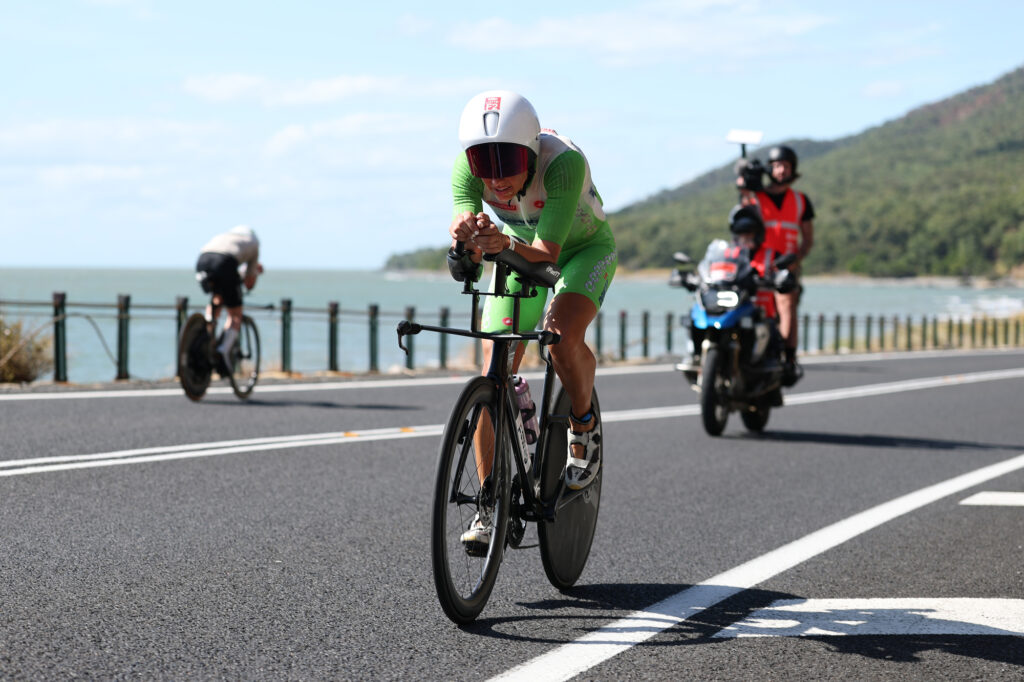
Photo: Cameron Spencer/Getty Images for IRONMAN
There is also the matter of maintaining one’s pro card. In many countries, it is easier to keep a pro card than it is to get one in the first place. Once more looking to the NBA as an example, when a player’s contract is renegotiated, his whole season is used to determine if he will get re-signed to his team, not just one or two standout performances. Again, triathlon does the opposite, and a professional can have 10 sub-par races in a season and still renew his or her pro card thanks to one performance in a slower race that was good enough to meet the elite criteria for their country.
Self-Selection
A big reason that there is such a huge discrepancy in the pro ranks of triathlon is because of ego. It undoubtedly feels good to be able to tell people you’re a professional athlete, and in a sport like triathlon (which many people know nothing about), a person can say they’re a pro without many follow-up questions. The subtext is simply, “I’m fast, I’m good at this sport,” and the expectation is that admiration will follow. Once again, there is nothing wrong with being slower than the best triathletes in the world, but before becoming a pro, one should maybe ask the question, “Do I have what it takes?”
This is the question on which the Deutsche Triathlon Union (or DTU, the German governing body in the sport) operates when it comes to professional licenses. In Germany, the DTU has no performance-based requirements standing between an athlete and a pro card. Instead, athletes simply pay a fee, submit the results of a medical examination, and register with the German National Anti-Doping Agency. After that, they are officially pros.
With that sort of system in place, one might assume that there are hundreds and hundreds of German pros running around Europe getting smashed at races every weekend, but that is not the case at all. In Germany, being a pro is not about the clout or the praise one gets for reaching this level, but rather for the pursuit itself. Unlike North Americans and athletes from other parts of the world, Germans are not satisfied with simply owning the title of professional triathlete, and they would be embarrassed to be passed by dozens of age groupers at a race as a pro. This sort of self-selection process works wonders for the DTU, as they still produce top-end talent (look at Anne Haug and Jan Frodeno, to name just a couple of athletes) without watering down the pro fields in races.
The Fix?
There are several ways this could potentially be fixed. One is to simply tighten professional qualification standards across the board. This would make it so only the most deserving athletes elevate to professional status in triathlon. Another is to keep the qualification standards as they are, but to add a tiered system to long-distance triathlon. Adopt the World Triathlon format and have a ladder athletes must climb in order to reach the most competitive and highly regarded races.
This is of course much easier said than done, and it is unlikely triathlon will see a revamping of its professional standards any time soon. It’s worth thinking about, however, and if you’re looking at going for your pro card, think about what you want as a pro: would you like to compete with the best and truly race every event you enter, or are you happy to simply possess the title without owning the performances to back it up?
Tags:
IRONMANIRONMAN 70.3pro cardpro triathleteprofessional triathletePTOUSATContinue the discussion at forum.slowtwitch.com
93 more replies

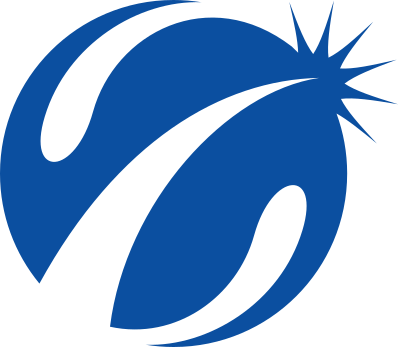

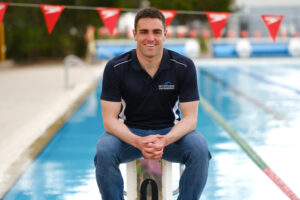

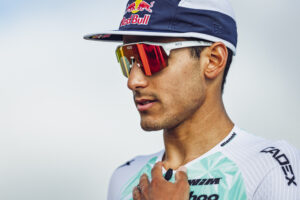

Without question in the US it’s too easy. I know a 45 year old who stumbled into a pro license and spent the past two years being DFL and he wouldn’t even have won his AG in those 70.3 races. It’s absurd.
Out of curiosity… why does it matter?
when i did my first pro ironman race 2005 i did not even have a pro card…
was good enough for12th place.
and back then if you finished top 10 in roth you were a pro and if you finshed 11th you were an age grouper.
There are not enough professional triathletes…there are also too many professional triathletes. I think the validation/re-qualification bit is what needs to change. If you don’t race a triathlon within 18 months of earning your pro card it’s revoked. That would reduce a lot of the chaff. And then for Veterans also make it 24 months instead of 36 months.
Interesting article, and series. I’d be curious to know whether there are significant differences across genders.
The problem is the qualification system and then the LC races don’t make sense. That you can gain your pro card and then enter any LC race you want (beyond qualification only races) is probably the bigger issue than how you qualify for your pro card. And there is no real solution since IM basically has their hands up not wanting to make a more defined tiered system. And I don’t think culling the pro card would necessarily solve the issue, beyond just keeping super weak elite qualifiers. By default AG-pro are going to *generally be BOP pro ability initially, so even if you cull it to cut out 1/3rd your still running into an issue of it being BOP ability coming into pro ranks and then racing in races sorta beyond their ability….because they can.
So it kinda has to be a both sides working together if your trying to solve the issue I think they want to solve.
Agree. The USA has a nickname, The Land of Opportunity. Now all you haters can chime in on your hate for America.
One of the issues obviously is people who qualify for their pro card at St Anthony’s, did so with intention, and then race amateur Long Course the rest of the season. That stuff needs to end immediately. There is the window in which you must take your pro card. Probably needs to be a limit on the number of races you are allowed to race and if you want to race more amateur races instead then your pro card offer is rescinded and you have to re-qualify.
So I would suggest each race series setup their own hurdles instead of the current- easy in US, hard in Australia, yet each then races with each other.
For the most part federations *generally cater towards itu w pro pathway because it’s a more defined/tiered process. So they could basically create specific license within the race organizers themselves, but IM doesn’t care/want that. So again culling the elite process in a free for all system is only half improving the system. You’re not solving the issue people are complaining about.
There is nothing stopping any race organization from creating their own pro standard if they wanted to. It’s already done that way in other multisport pro divisions now (and for decades)
With how Triathlon is set up, the governing body of the world controls the licensure process. I doubt the ITU wants to give that up. As I said in my first post, there are too many and there are also not enough. Before the PTO and now the IM pro series you had hundreds of qualified pros across the globe that wouldn’t race as pros, ever. They would get their card, take it and then not race or only even race once because they had a 3 year period. If you tighten up the validation piece either they will race more or they will go away through attrition. If you’re a fan of pro racing, you want more pros racing more often.
But even when there was the non-draft short course pro races out there, the volume of athletes with pro cards not racing was still significant. So I suppose we can make it harder, but then less people will even look at triathlon.
I’m saying it’s almost irrelevant if WT has elite license power or not…. If IM wanted to create a stricter standard it 100% could and would not be in any violation. They are a private run organization they would have waaaay more power to fix this problem then the individual federations who again by default don’t even have an across the board process.
It’s already being done in our sport in other multisport versions. IM just has no desire, that’s the issue.
Neither does PTO or Challenge. This isn’t a problem for Ironman to solve. All of the federations could tighten or loosen. The issue we have is the pros get their cards and then don’t race. Not the slow pros that do race.
Agree to disagree. Even more so when there is no actual across the board standard for elites through the federation/WT pathway. So what I’m suggesting is create that. You generally would do that within your own organization.
So if you want to solve the issue that the OP is doing it’s not going to be through the federation policy because again we already see so many different acceptances. IM could create their own stricter standard- again we have examples already to solve this very issue of “shit pros” in your sport with Duathlon. Power man is the pro Duathlon standard and has their own stricter pro standard than just being a “pro”. It can be done and we have examples to follow, if you’re wanting a solution.
There can’t be a single WT standard cus there are so many different federations with different needs. GER is going to have a much higher standard than Cuba, etc. So the federation pathway is always going to be the least impactful way to cull the pro standard. Again you can tighten it or loosen it for whatever needs you need, but again if you’re then going into a free for all pro race series- that’s the issue to address.
I’m confused. I’m 65yo and am happy with a 6hr 70.3. (MOP I suppose) and yet, if I sign up for a race where LCB and KB are racing, I’m “competing” against them. If they have an injury and DNF, I beat them (LOL).
But what is really the issue? Is it we don’t want people to be able to say “I’m a pro triathlete” unless they can finish in the top nn of a giving race? I’m missing the big deal and don’t see the problem that needs solving.
And if you think “pro” basketball, football, soccer, tennis, golf, name-your-sport is “better” in someway, wait until the NIL finishes running through it’s natural course. You’ll have guys running 12 second 100m in JCo who are “pros” and girls who might not make a top soccer high school team playing “pro” at a low-level D1 school.
Again, what is the problem that needs solving?
Top pros gotta look down on wanna-pros. It’s about as triathlon-y as you can get.